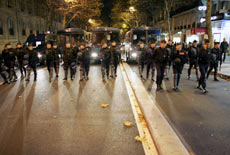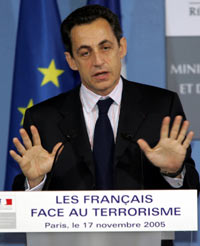|
France
Riots Subsiding After Weeks of Unrest
 |
|
French
policemen arrive at site of protest against government's handling
of recent unrest in Paris. (Reuters)
|
PARIS,
November 17, 2005 (IslamOnline.net & News Agencies) - French
police declared the all-clear Thursday, November 17, after three weeks
of civil violence that has set off a fierce debate over the country's
poor and immigrant neighborhoods.
As
politicians grappled with the root causes of the unrest in a bid to
stop it exploding again, the national police service said there was a
"return to a normal situation everywhere in France"
overnight, with just 98 vehicles torched across the country, reported
Agence France-Presse (AFP).
That
figure was within the average nightly range seen before the worst
civil unrest that France has seen in nearly four decades broke out on
October 27.
In
all, since the start of the troubles, 9,071 vehicles have been
destroyed and 2,921 people apprehended.
A
state of emergency remains in place, after lawmakers Wednesday,
November 16, voted to extend by three months a law giving authorities
the right to impose curfews and widen police search powers.
The
peak of the violence was the night of November 6, when 1,408 vehicles
were burnt.
Since
then, and under the state of emergency imposed by President Jacques
Chirac's government, it has gradually subsided.
The
Rhone region covering Lyon and nearby southeastern towns said Thursday
it was lifting a curfew on minors after just eight cars were burnt
overnight.
Initially
sparked by the electrocution deaths of two teenagers of west and north
African background hiding from police in an electrical sub-station in
a poor neighborhood northeast of Paris, the conflagration grew as
youths from high-immigrant districts across the country joined in.
Many
voiced anger at racial discrimination despite being born in France, a
lack of educational and employment prospects and police harassment.
Interior
Minister Nicolas Sarkozy was singled out for vitriol because of his
description of "rabble" and "louts" and a vow to
clean crime out of the suburbs with a "power-hose".
Positive
Discrimination
 |
|
"I
consider that there is no greater risk for France today that the
risk of not taking any risk," said Sarkozy. (Reuters)
|
Sarkozy,
a tough-talking presidential hopeful who also heads the ruling
conservative UMP party, warned late Wednesday that, while the fires
had died down, "nothing has yet been won for good."
Sarkozy
also appealed for positive discrimination to be introduced as a way of
helping minorities find jobs and said deep social changes were needed.
"I
consider that there is no greater risk for France today that the risk
of not taking any risk," he told L'Express magazine.
But
Chirac has opted for modifications to the existing system and has
ruled out the constitutional reform required to give preferential
treatment to minorities.
The
president's main proposal has instead focused on a sort of civil
service for up to 50,000 youths, while Prime Minister Dominique de
Villepin has promised schemes to improve employment and education, and
increasing the number of zones given tax breaks.
In
a poll released Wednesday, there were signs that the stern stance by
Sarkozy, and the government in general, was backed by the majority of
French.
Sarkozy,
Chirac and de Villepin all saw their popularity ratings get a boost in
the Ipsos survey carried out November 12, with the interior minister
benefiting most to garner 63 percent support.
Importantly
for his ambitions, his "presidential vote potential" climbed
to 61 percent, above the 53 percent for Villepin, seen as the
designated heir of Chirac, who, at 72, looks increasingly unlikely to
stand for re-election in 2007.
It
was not clear, though, if the figures would stand the test of time,
nor that the show of government unity that prevailed during the crisis
would hold now that the worst has passed.
|